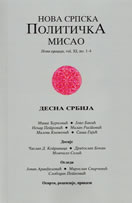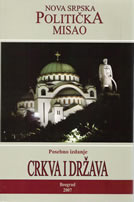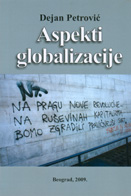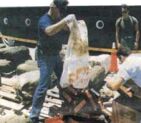| NSPM in English | |||
Albanian Narco-Terrorism: The Columbian Syndrome in the Balkans and Around |
 |
 |
 |
| utorak, 28. april 2009. | |
|
Euro-officials echo with Obama repeating the same old tune of «achievements of democracy and progress of democratisation in Kosovo.» All in vain: the Albanian criminal organisations are running full speed ahead to achieve both the Albanisation of the Balkans with a prospect of further segmentation of the states in this region, and unification of Albanian territories. Their design is much larger in scope. They think of transforming the Balkan Peninsula into a stronghold of the Albanian mafia controlling the drug trafficking routes to Europe and extending criminal activities of Albanians to cover the entire European continent. Lately, the policical, military, diplomatic and financial support of the «Pristina authorities» by the USA and EC has enabled criminal Albanian clans to challenge law and order on a larger than ever scale. Another scandal involving activities of the Albanian émigrés is flaring up in Britain. A criminal group of professional killers from Albania openly proposed their services to the British capital: «Any target – 5,000 using any weapon – cold steel or fire-arms». The London Daily News called Albanians based in London (mostly former militants of the Kosovo Liberation Army –KLA) the most sophisticated professional killers in the British capital. One of the kingpins of the Albanian criminal group said in an interview that his men know how to use arms, they control prostitutes in Soho, so they make their sizeable investment in London, fearing no one. He added that the law could not stop them.[1] A great number of «Albanian refugees from Kosovo» have found shelter in many European countries, where they can apply their «skills». In reality they have nothing to do with refugees rather being members of a widely ramified network of the criminal organisation, whose principal activities include manufacturing and supplying heroin and cocaine to the European and other countries. According to a number of estimates the Albanian mafia controls about 75% of supplies of heroin to the West European drugs market and up to 50% of the total amount of heroin sold in the USA. Albanian drug cartel «Camilla» is among the world’s top five drug cartels. About 30 drug clans are responsible for heroin’s supply to Europe, each controlling their own segment of drug traffic. Almost all of the Kosovo territory serves as the base of the drug traffic, becoming the principal transit mainline of drug supplies to Europe. One of the key links in this chain is what is known as the «Drenitza segment» including Prizren, Klina and Istok that connect Kosovo with Montenegro and Macedonia. Aside from heroin, the principal source of income of the Drenitza group is smuggling arms, stolen cars, cigarettes, alcohol and slaves. The Albanian criminal clans are connected with Macedonian, Bulgarian and Czech mafias; they are on the threshold of taking under their control a number of European capitals, starting with London, Berlin and Prague. The monthly trade turnover of Albanian clans amounts to 4 tonnes to 6 tonnes of heroin with the annual turnover of heroin amounting to $2bln. More than 200 private banks and money-changing outlets controlled by the Albanian drug clans plus beauty salons, perfumery shops, cafés and so forth, do the laundry in Italy, Spain, Britain and other European countries. Behind the backs of Albanian drug traffickers are two US military bases, Bondsteel and Minor Bondsteel in Kosmet, as well as the entire US and EU support complex ranging from mass media to military assistance, making them more than secure. For example following the deployment of NATO troops Albanian criminals wanted by law enforcement agencies found a safe shelter in Kosovo. Albanian «mafiosi» are easy to recognise: they move around in black Mercedes cars or Jeeps without licence plates and with toned windows. The KFOR troops ignore the cars without licence plates, but local residents know that these cars are stolen and smuggled into Kosovo. The suspects of crime will not be extradited to Albania as the KFOR does not have a relevant agreement with that country. After Kosovo the strike can be targeted at Serbia’s southern parts of Presevo, Buyanovatz and Medvezhiya with an eye at gaining control of the strategic direction to the link of Kosmet, Macedonia, Serbia, Bulgaria and farther still – Greece and Central Europe. Albanian drug criminals have great aspirations. Controlling the quasi-state of Kosovo they are approaching implementation of the project of division of Macedonia to grab control of its greater part. For example, Macedonia’s western parts are controlled by the Taci clan. M.Taci, the chairman of the «Democratic party of Albanians» has direct connections with the mafia that controls supplies of heroin, cocaine and automobile. Before the 1999 bombings of Yugoslavia, the Paris Anti-Drug Group published information about the Albanian drug mafia in Kosovo and Macedonia that had been selling heroin and arming their kinsfolk in Kosmet, with drugs bases in Skopje, Skadar and Pristina from where drugs had been taken to Switzerland, Germany, Italy and Greece. A major heroin factory is located in Kumanovo, a place near Macedonia. As a matter of fact, the entire region including Albania, Kosovo and western Macedonia is a huge drug warehouse storing tonnes of heroin. Sales figures amount to billions of dollars, but no information has been available about Albanian drug barons taken into custody. Right from the start the Albanian separatist movement in Yugoslavia was based on the activities of drug mafias. However, until early 1980s the issue of Albanian smuggling of drugs from the Middle East via the Balkans to Europe and the USA was raised but occasionally. Albanians then acted as traffickers controlled by the Turkish drug mafia and Bulgarian criminal organisations. The growth of involved in the implementation of the «Great Albania» project. The dramatic change of the status of Albanian drug clans happened in late 199os when the US States Department began implementing its geostrategic plans deciding to use Albanian criminal groups as a tool in achieving its goals. They gave Albanians all-round assistance complete with bombing Yugoslavia for 78 days. Besides, Bill Clinton’s democratic administration is responsible for the establishment in northern Albania of special camps in Kosmet and Macedonia to train Albanian militants in sabotage and acts of terror. Supported by the USA in the first years of the 21st century the Albanian underworld turned into a «state within a state» with heroin and arms as their principal political arguments. The leaders of Kosovo Albanians, Taci, Haradinai and Ceku are not only the kingpins of the illegal armed groups, they are the bosses of the Albanian drug mafia that financed KLA, the terrorist Albanian army (now changing its name to the «Kosovo Security Force»). The drug money they grabbed in different parts of the word returns to Kosovo in the form of investments in separatism of «The Republic of Kosovo (a.k.a. «The Republic of Heroin»). The Berish clan is the most influential in Albania. It also controls several districts of Metohia. The clans of the Kula family that controls drug traffic, and supplies of arms and illegal migrants from Turkey, the Abazi clan (drugs and prostitution in cooperation with Italian criminals), the Brokai clan (whose backbone is made of people who previously worked for special services and politicians now engaged in drugs, arms and prostitution). About 80% of the Hungarian heroin market is controlled by the Albanian mafia. The bulk of the money is spent on Italy for the purchase of arms. The Albanian narco-mafia succeeded to oust Turks out of that country. The former messengers, Albanians turned into organisers of the drug network and partners of the Sicilian Cosa Nostra, the Naples-based Camori and the Calabrian N’dragenti. Italy is now one of the bases of the Albanian criminal structures handling 50 kilograms of heroin DAILY! Milan is their business centre, and the province of Calabria is the centre of drugs and arms trade. Albanians also control drug traffic on the Italian-Swiss border. Switzerland is their major «base» in Europe. The centres of the arms trade «black exchange» are in Bern and Basel. During the recent visit to Switzerland of the Serbian foreign Minister V.Eremic the 4th degree safety measures were taken because of the open threat of his physical destruction by the Albanian crime. The principal suspect was the Osmani clan, headed by someone Casim («Felix»). This clan is funded by the biggest Albanian «businessman» Bejet Pakkoli from Kosovo. Kosovo Albanians also control 80% of drug trade in Sweden and Norway, being the principal distributors on the Greek cocaine, heroin and marijuana markets. Albanians rely on the Greek transfer to supply Albanian migrants and outcasts from Turkey, Pakistan, Sri-Lanka, China and other countries who also act as messengers for the delivery of drugs. The Adriatic Sea that connects the shores of Italy and Albania is another corridor they use. According to information posted by the Slovakian police almost 100% of heroin arrives from Afghanistan via the «Balkans traffic» through Kosovo, Macedonia and Albania. Lately the Albanian groups began to grab control of Romanian ports. The FBI, Interpol and Europol unanimously evidence that the Albanian mafia has become the most serious criminal organisation. Defending its interests it is ready to stand to the last man, turning into a threat to the fundamentals of security of the United States and the states of the European Union. http://en.fondsk.ru/article.php?id=2091 [1] http://www.politika.rs/rubrike/Svet/bivsi-pripadnici-OVK-kontrolishu-londonsko-podzemlje.sr.html |
Ostali članci u rubrici
- Playing With Fire in Ukraine
- Kosovo as a res extra commercium and the alchemy of colonization
- The Balkans XX years after NATO aggression: the case of the Republic of Srpska – past, present and future
- Iz arhive - Remarks Before the Foreign Affairs Committee of the European Parliament
- Dysfunction in the Balkans - Can the Post-Yugoslav Settlement Survive?
- Serbia’s latest would-be savior is a modernizer, a strongman - or both
- Why the Ukraine Crisis Is the West’s Fault
- The Ghosts of World War I Circle over Ukraine
- Nato's action plan in Ukraine is right out of Dr Strangelove
- Why Yanukovych Said No to Europe

.jpg)








 Reality crosses out all attempts of Washington and Brussels to present Kosovo, as Barack Obama says, as a «multi-ethnic independent and democratic formation.»
Reality crosses out all attempts of Washington and Brussels to present Kosovo, as Barack Obama says, as a «multi-ethnic independent and democratic formation.»












